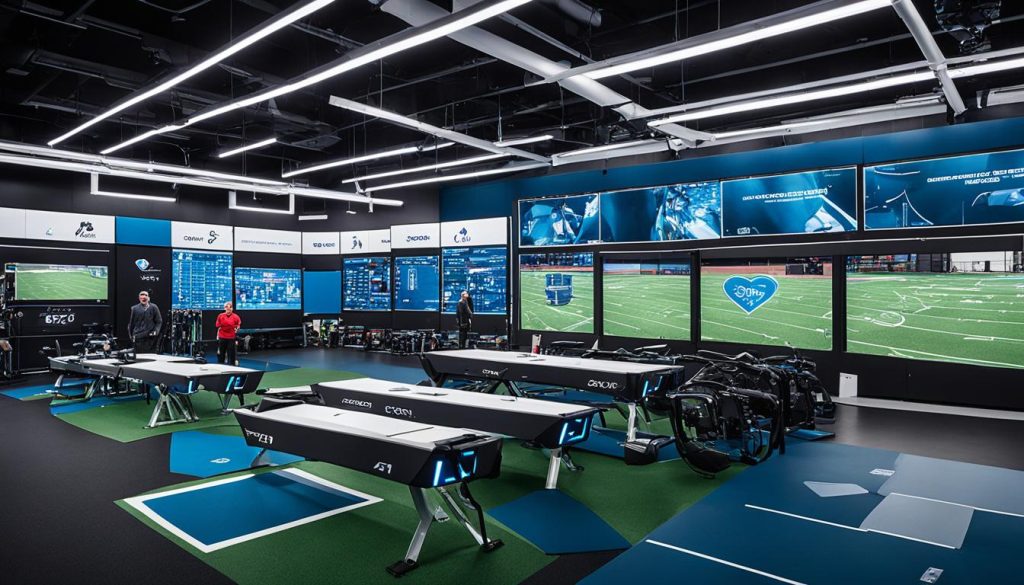“Success is no accident. It comes from hard work, perseverance, learning, sacrifice, and loving what you do.” – Pelé. This quote sums up the key to starting a sports coaching business in Italy. Italy is famous for its sports culture and passionate athletes.
Starting a sports coaching business in Italy is a great chance for entrepreneurs. With its wide range of sports, from football to cycling, your coaching skills can flourish here. The Italian market values quality coaching, making it a perfect place for newcomers.
This article will guide you through the important steps to set up your sports coaching business in Italy. We’ll help you get ready for the challenges and benefits of this exciting field.
Key Takeaways
- Understand the growing demand for sports coaching in Italy.
- Identify your unique coaching niche to stand out in the market.
- Develop a comprehensive business plan tailored to the Italian sports culture.
- Be aware of legal requirements and regulations for starting your business.
- Establish a strong brand identity that resonates with your target audience.
- Utilise effective marketing strategies to promote your coaching services.
Understanding the Sports Coaching Landscape in Italy

The sports coaching scene in Italy is lively and always changing. It shows the country’s deep love for sports. Basketball, football, and cycling are big sports here, while rugby and volleyball are getting more popular.
There are key trends changing the coaching world. More people want coaches for youth sports, so there’s a big need for skilled trainers. Those who know the local culture and adapt their coaching do better with clients.
Technology is also changing how coaches work. Now, online platforms help coaches reach more people and offer flexible training. This change brings new chances for creative coaching and meeting different client needs.
Identifying Your Niche in Sports Coaching

Understanding the sports landscape is key to finding your coaching niche. Italy has a deep sports culture, with some sports more popular than others. Looking at popular sports in Italy can help you see where your coaching skills can make a difference.
Popular Sports in Italy
Football, basketball, and volleyball are big in Italy. Each sport has its own coaching needs:
- Football: It’s the top sport, loved by people of all ages. There’s always a high demand for special training and youth programmes.
- Basketball: This sport is fast and strategic. Coaches can focus on skills and fitness to attract players.
- Volleyball: It’s popular in both fun and competitive settings. Coaches can work with players at all levels, from schools to pros.
Assessing Market Demand
To set up a successful sports coaching business, it’s vital to know what people want. Market research shows what coaching is needed in the community. Here are some strategies:
- Surveys can tell you what clients like and what they’re looking for.
- Focus groups can help you understand training needs and goals.
- Looking at coaching trends shows where interest and participation are going.
Knowing your target market helps you make smart choices about which sports to coach. This way, you can offer services that really meet what people need.
Creating a Business Plan for Your Sports Coaching Venture

Starting a sports coaching business needs careful planning and a clear approach. A good business plan acts as a guide to reach your goals. It sets clear objectives that match your passions and what the market wants.
Defining Your Business Goals
It’s key to set specific goals for success. These goals can be long-term or short-term:
- Long-term goals might include growing your coaching services, offering top training camps, or working with local sports clubs.
- Short-term goals could be getting more clients, making sure they’re happy, and building a strong brand in the area.
Having these goals match your vision will keep you and your team motivated as you expand your business.
Financial Planning and Budgeting
Good financial planning is vital for your business’s success. Knowing the startup costs gives you a clear idea of what you need to start. Think about expenses like:
- Buying equipment.
- Marketing and promoting your business.
- Day-to-day costs, such as rent, bills, and staff salaries.
Having a budget for sports coaching helps you manage your money well. Keeping an eye on these costs lets you make changes if needed. A solid financial plan supports your business’s growth and helps you grab new opportunities.
Legal Requirements for Starting a Business in Italy

Starting a sports coaching business in Italy means you must follow certain legal rules. It’s key to know these laws to succeed. You’ll need to register your business, get the right permits, and get insurance.
First, you must register your business. Choose a legal form that fits your coaching business, like a sole proprietorship or a limited liability company. Then, register with the Italian Chamber of Commerce and get a VAT number.
- Permits: You might need local permits based on where you coach and the services you offer.
- Insurance: Liability insurance is a must for sports coaching to cover injuries or accidents.
- Employment Laws: It’s important to know the rules about hiring coaches or staff. Make sure you follow Italian labour laws on contracts, pay, and working conditions.
Knowing about sports coaching law is also crucial. These laws cover things like athlete safety and qualifications. Keeping up with law changes and business rules helps you stay compliant.
Choosing a Suitable Location for Your Sports Coaching Business
Starting a sports coaching business needs careful thought on where to set up. Deciding between urban and rural locations has its pros and cons. It’s important to look at things like how many people live there, how much competition there is, and if there are good facilities nearby.
Urban vs. Rural Considerations
Urban places usually have more people, which means more potential clients. But, there’s also more competition from other coaches. Rural areas might have less competition but fewer people to coach.
When thinking about these places, consider:
- How close you are to sports facilities.
- If you have the resources for different coaching types.
- How well you can connect with the local community.
Accessibility for Clients
Getting to your coaching business easily is key to its success. Good transport links make it simple for clients to come. Things like buses, parking, and how close you are to sports places matter a lot.
A well-chosen location makes things better for clients, making them want to come back. Focusing on these points helps make a strong plan for where to set up your business.
Setting Up a Strong Brand Identity

Creating a strong brand identity is key for any sports coaching business. It includes things like choosing a business name, designing a logo, and making marketing materials. A good brand identity draws in clients and shares your coaching beliefs clearly.
Creating a Memorable Business Name
Start by thinking of a business name that speaks to your audience. A catchy name helps shape your brand. Here are some tips for a unique name:
- Reflect your coaching philosophy and services offered.
- Incorporate relevant keywords that relate to your niche.
- Test potential names with your target market for their preferences.
Choosing a business name is a big step in making a mark in sports coaching. After picking one, make sure it’s used everywhere.
Designing a Professional Logo and Materials
A professional logo is key to a recognisable brand. It shows off your values and what you offer. Think about these things when designing your logo:
- Simplicity: A simple logo is easier to remember.
- Colour Schemes: Pick colours that match your brand’s feel.
- Consistency: Make sure your logo and all materials look the same everywhere.
Being good at branding in sports coaching also means using the right materials. Things like brochures, business cards, and online stuff should match your brand. This keeps your brand strong and leaves a good impression on clients.
Building a Comprehensive Coaching Programme

Creating a successful coaching programme needs careful thought on skill levels and local sports culture. A well-planned programme makes sure athletes of all skills feel valued and supported.
Tailoring to Different Skill Levels
To get more people involved and improve their skills, coaching must be tailored. This means offering different levels of training. Here’s how:
- Beginner sessions focused on basic skills.
- Intermediate training that builds on what athletes already know.
- Advanced coaching for those aiming for top performance.
This way, the programme welcomes a broader range of athletes, boosting community involvement.
Incorporating Local Sports Culture
A good coaching programme should mirror the local sports culture and traditions. Knowing what the area is into helps coaches connect better with athletes. Adding local sports practices makes athletes feel part of something bigger, which is key for community support.
Ways to bring local sports culture into the programme are:
- Getting community members involved in planning the programme.
- Showing local sports traditions during training.
- Hosting events to celebrate local sports wins.
These steps make the programme more appealing and strengthen the link between coaches and the community. A programme that reflects local sports culture makes training more meaningful for everyone.
Marketing Strategies for Your Sports Coaching Business

Effective marketing strategies are key for any sports coaching business to succeed. A strong online presence and community engagement can boost your sports coaching promotion. Using different promotional methods will draw in potential clients and make your brand stand out.
Utilising Social Media for Promotion
Social media is a great tool for promoting sports coaching. By posting engaging content on platforms like Facebook, Instagram, and Twitter, coaches can connect with people and grow their brand. Here are some tips:
- Share success stories and testimonials to build trust.
- Post tips and videos to show your knowledge.
- Talk to followers by answering comments and messages.
- Use targeted ads to reach people interested in sports coaching.
With a smart approach, social media can improve your online presence, bring in new clients, and build a loyal community around your coaching.
Networking with Local Sports Clubs
Working with local sports clubs can lead to more promotion and client referrals. Networking can help you work together, making your outreach better. Here are some ideas:
- Go to local sports events to meet club reps and other coaches.
- Offer free trial classes with local sports clubs.
- Work together on events or workshops that help both your business and the clubs.
- Share resources or training with clubs to build good relations and show your skills.
By using these local partnerships, coaches can make their brand more visible and reach new clients in the sports community.
Pricing Your Services Effectively

Setting the right price for your sports coaching business is key. You need to look at things like what others charge, how much value your services offer, and what makes you different. Knowing the local market helps you set prices that are competitive yet sustainable for your business.
When thinking about what to charge for coaching, consider these points:
- Look at what others in your area charge to see what’s normal.
- Think about the value you bring to your coaching.
- Match your prices with what your target audience can afford.
Using a competitive pricing strategy can make you stand out. Offer deals, discounts for early bookings, or packages to draw in different types of clients. Make sure your prices show the quality and results of your coaching, so clients know what they’re paying for.
Establishing Partnerships with Local Schools and Organisations

Working with schools and local groups is key to a coaching business’s success. It helps you reach more people and make your youth coaching more appealing. By working with schools, coaches can connect with young people who want to get into sports.
Benefits of Collaborating with Educational Institutions
Teaming up with schools brings many benefits. These include:
- More visibility among young athletes and their parents.
- Use of school facilities for training and events.
- Custom coaching programs that fit school lessons.
- Being seen as a key player in local education and youth development.
This helps grow youth coaching and gets the community involved.
Engaging with Community Sports Events
Being part of local sports events is a great way to show off your coaching work. These events help build community ties and create partnerships with similar groups. Being at and supporting these events can lead to:
- Meeting other coaches and groups.
- More people knowing about your brand.
- Showing off your coaching skills to potential clients.
- Finding new young sports talents.
Being a part of the local sports scene helps build strong connections. This boosts your reputation and reach.
Recruiting and Training Coaches for Your Business

Finding the right coaches is key to a strong coaching team. They must share your vision and have the right skills. It’s important to look for people who fit your coaching style and goals.
After hiring coaches, focus on their training. Keeping them updated with new trends helps them improve. This means better training for athletes and a stronger team.
Regular workshops and seminars help the coaching staff bond. This creates a supportive team that works well together. A united coaching team is crucial for a great experience for athletes.
Investing in recruiting and training coaches is vital for a successful sports business. By focusing on these areas, you can keep high standards and reach your goals.
Implementing Technology in Your Coaching Business

In today’s fast-paced world, using technology in sports coaching is key. Performance analysis tools make training better and help coaches do their job well. They let trainers see how players are doing, look at performance data, and change strategies as needed. This helps coaches use their athletes’ full potential by making smart choices.
Using Tools for Performance Analysis
Performance analysis tools give deep insights into athletes’ strengths and weaknesses. Coaches can make training plans that fit each athlete’s needs. The benefits of these tools are:
- Data-driven insights for customised training programmes
- Identification of performance trends over time
- Enhanced engagement through interactive feedback
Adding these digital tools to coaching can really improve how well athletes perform.
Online Coaching Platforms
Online coaching platforms help trainers reach more people, offering flexible training. They make it possible for athletes to train from anywhere. The main benefits are:
- Accessibility to resources and expertise no matter where you are
- Flexibility in setting up training sessions
- Cost-effective for both coaches and clients
Using online coaching can boost client engagement and make the coaching experience better overall.
Providing Excellent Customer Service

Building a strong customer service base is key to any coaching business’s success. By asking for client feedback, coaches can improve their services. This makes sure they meet their clients’ needs better. Using a clear method to get feedback makes the coaching better, building trust and openness.
Gathering and Implementing Client Feedback
Listening to clients’ feedback makes them feel valued. It leads to a coaching environment that responds to their needs. Here are some ways to do this:
- Regular surveys help check how happy clients are and what they think could be better.
- Talking openly during sessions gets immediate feedback.
- Using feedback forms after training gets detailed opinions.
This feedback helps improve services, making coaching better for everyone.
Creating a Supportive Community
A coaching community keeps clients coming back and engaged. It grows through:
- Group activities that build teamwork and friendship.
- Setting up social media groups for support.
- Workshops and events for clients to meet outside of coaching.
These steps make a welcoming space. They also make the coaching community stronger, making everyone feel part of it.
Evaluating and Adapting Your Coaching Services

Regularly checking how well your coaching works is key to a successful business. It helps coaches spot what’s going well and what needs work. This way, they can keep getting better. It’s important to change how you coach to keep clients happy and interested.
Changing your coaching methods is vital in sports where things can change fast. Clients’ needs can change quickly, so being flexible is a must.
To make your coaching better, try these tips:
- Get feedback from clients through surveys and talking to them. This helps you understand what they think of your coaching.
- Look at how well your clients are doing and where they might need more help. This could mean changing how you coach them.
- Keep up with new ways of coaching and sports science. Use what you learn to make your coaching better.
- Talk openly with clients about what they want to achieve. This helps you tailor your coaching to their needs.
Putting a lot of effort into checking your coaching makes you a better coach. It also helps your business do well. By always looking to improve and adapt, you can stay ahead in Italy’s sports world.
Staying Informed About Industry Trends

In the fast-changing world of sports coaching, knowing about sports education trends is key. Coaches need to keep learning to improve their skills and serve their clients well. Staying updated with coaching certifications and regulatory knowledge is vital for quality training.
Keeping Up with Sports Education Developments
To succeed in sports coaching, it’s important to stay on top of new trends. This means:
- Going to workshops and seminars for professional growth.
- Looking into online courses for the latest in coaching methods.
- Talking to other professionals to learn about what works best.
Understanding Changes in Local Regulations
Knowing about local sports regulations is a must for staying compliant and avoiding risks. Keeping up with changes in laws and safety rules helps coaches adapt. Important steps include:
- Checking compliance updates from governing bodies regularly.
- Talking to legal experts about new rules and their effects.
- Making changes to training to follow new local laws.
Success Stories: Inspirational Coaches in Italy
Italy is full of successful coaches who have changed their communities through sports. They don’t just improve athletes’ skills. They also teach teamwork and discipline. Many have turned local sports clubs into lively places, welcoming people of all ages and backgrounds.
These coaches, especially in football and basketball, offer training for all skill levels. This makes sports more accessible and boosts success among young athletes. Their hard work shows how coaching can spark commitment and excellence.
Their impact goes beyond the athletes they train. It spreads to the community, promoting healthy living and teamwork. By looking at their stories, new coaches can learn a lot about coaching and growing a business.
These coaches show the value of being resilient, always learning, and adapting. For those starting their coaching journey, their stories are a great source of inspiration. They show what it takes to make a real difference in sports.









